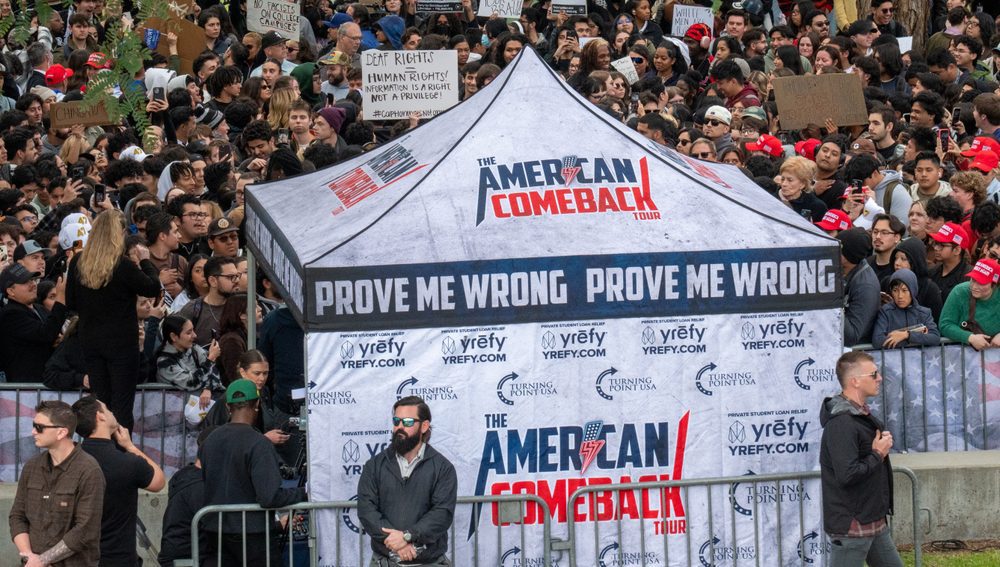Executive Summary
The Story So Far
Why This Matters
Who Thinks What?
Following the assassination of political commentator Charlie Kirk, President Donald Trump escalated his rhetoric, suggesting conservative extremists had legitimate reasons for radicalization while blaming “radicals on the left” for political violence. In contrast, Utah Governor Spencer Cox has actively sought to de-escalate tensions, calling for unity and civility in public statements following the apprehension of a suspect in Kirk’s killing.
Contrasting Responses to Kirk’s Assassination
In the approximately 40 hours between Kirk’s assassination and the announcement Friday of a suspect’s apprehension, some Republicans, pundits, and influencers spoke of “war” and the radicalization of their side. President Trump, who had previously suggested cracking down on what he described as leftist and liberal organizations, further intensified his rhetoric Friday morning.
Trump implied conservative extremists had legitimate reasons for radicalization, while asserting that “radicals on the left are the problem.” This stance came at a time when politicians typically call for calm, leading to concerns that his rhetoric could further inflame political tensions.
Governor Cox’s Call for Civility
The tragedy in Utah has spotlighted Governor Cox, a Republican who has long advocated for a more civil approach to politics. During two press conferences late Thursday and early Friday, Cox offered a message distinct from that of Trump and other leading figures.
Cox explicitly decried the tendency to “point the finger at the other side,” a practice he noted Trump and others have engaged in. He emphasized that returning violence with violence or hate with hate only allows political violence to “metastasize,” urging a collective “off-ramp” to prevent the situation from worsening.
The Governor also stressed that “there is one person responsible for what happened here,” countering speculative claims that blamed the political left before a suspect was identified. Investigators are still working to understand the suspect’s motivations, though a family member reportedly told authorities the individual had become more political in recent years and had mentioned disliking Kirk’s viewpoints.
Cox made a point to reference Kirk’s own past comments, which emphasized the importance of forgiveness, nonviolence, and avoiding internet rage. He framed the current moment as a choice between escalation and de-escalation, urging individuals to choose the latter.
Cox’s Consistent Political Brand
Cox’s response aligns with his long-standing political brand. He has encouraged people to log off social media, citing foreign adversaries like Russia and China who he said attempt to foment violence with disinformation. He advised individuals to “log off, turn off, touch grass, hug a family member, go out and do good in your community.”
At the National Governors Association, Cox and Maryland Democratic Governor Wes Moore have spearheaded a “Disagree Better” campaign aimed at fostering healthier political dialogue. During his 2020 gubernatorial campaign, Cox even filmed an ad with his Democratic opponent, emphasizing civil politics and the need for a “peaceful transition of power” weeks before Trump’s efforts to challenge the 2020 election results.
This attitude has occasionally put Cox at odds with Trump. Cox, who did not vote for Trump in 2016, 2020, or initially in 2024, reversed his stance after an assassination attempt on Trump, stating that Trump then had “the opportunity to do something that no other person on earth can do right now: unify and save our country.”
Outlook and Reception
While emotions remain high, Cox’s prominent role in the press conferences, even alongside officials like FBI Director Kash Patel, suggests a deliberate effort to temper the national mood. His actions have garnered bipartisan praise, with some on the right also urging Trump and his allies to moderate their rhetoric.
The contrasting responses from President Trump and Governor Cox highlight a significant divergence in approaches to political violence and national unity following a high-profile assassination. Cox’s emphasis on civility and de-escalation has been met with positive reception, even as the political climate remains charged.








